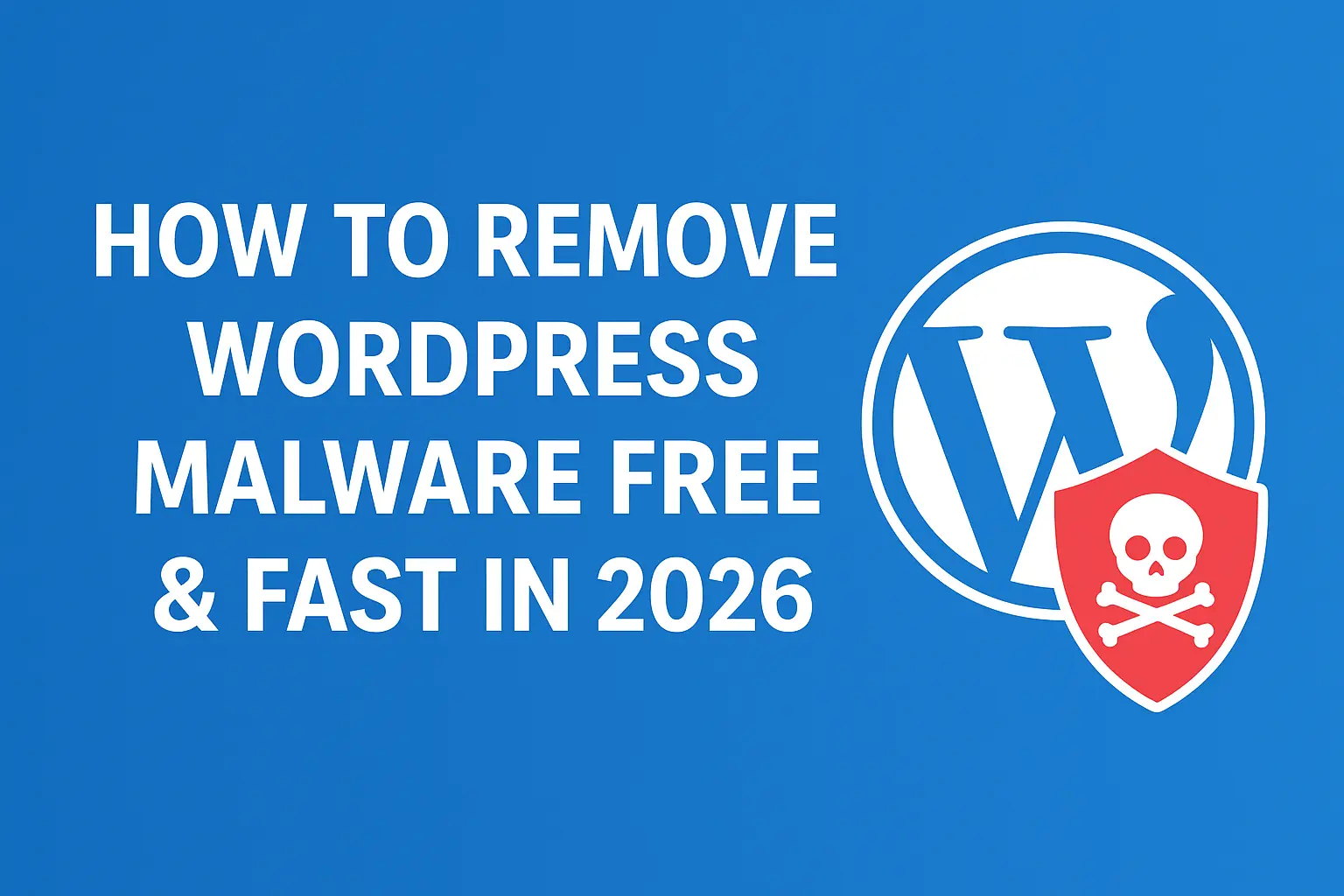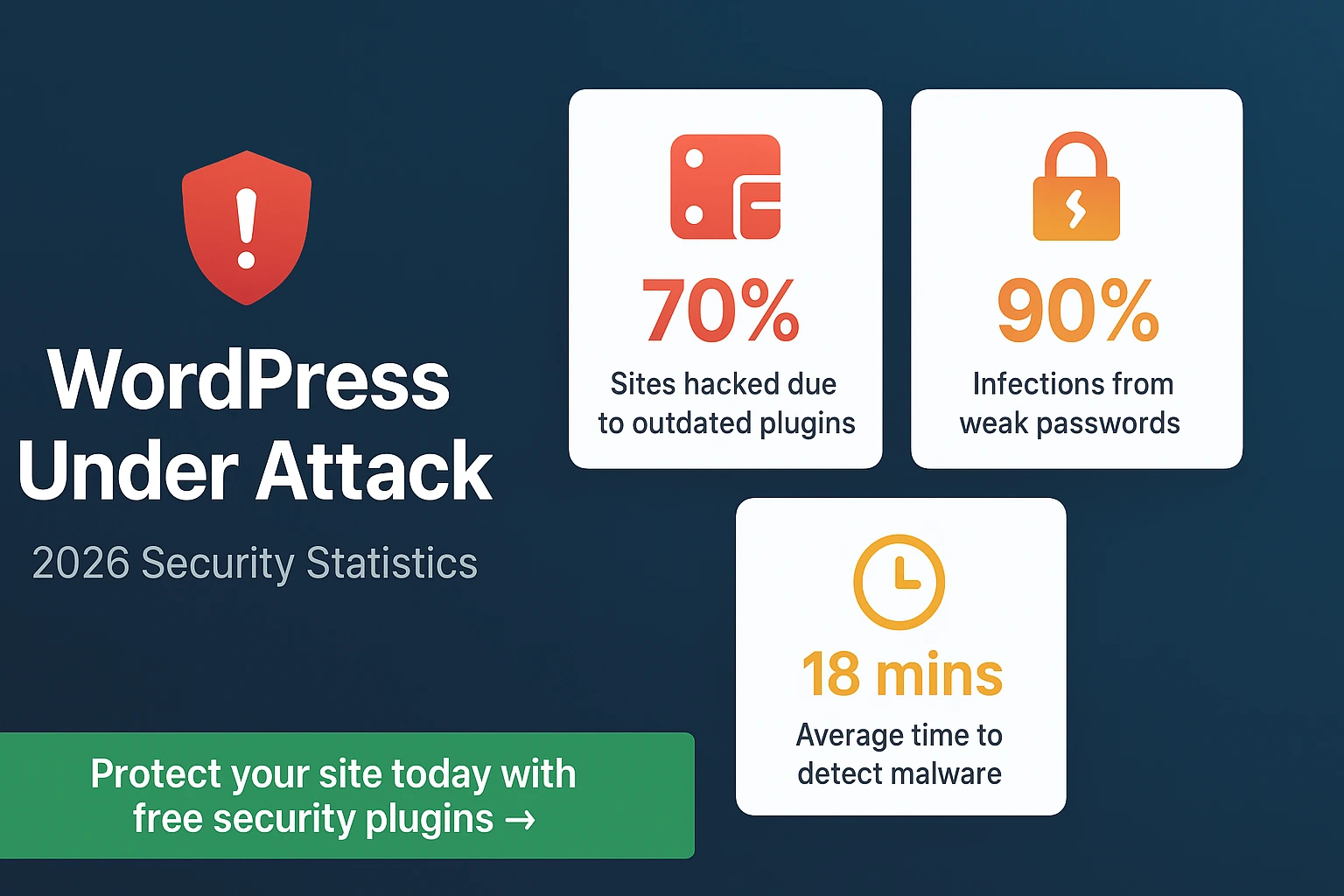Check out
WordPress Migration: Beginners Guide in Easy Steps 2026When website owners notice that their sites are displaying security warnings, sending users to spam websites, or being blacklisted by Google, Remove WordPress malware process turns into a terrifying emergency. The threat of losing years’ worth of content, destroying customer trust, losing revenue, and having search rankings fall overnight is too great to handle. As their digital assets deteriorate and hackers continue to gain control, many website owners become alarmed and think they must hire costly developers or start over.

The good news is that anyone can restore their websites and get rid of WordPress virus infections without having to pay hundreds of dollars for expert assistance. Even novices can successfully clean hacked WordPress site installations and put robust WordPress malware protection in place to stop future attacks thanks to modern WordPress security plugin tools and methodical techniques.
Website owners should be aware of these important facts to remove wordpress malware before beginning the cleanup process:
Allow security experts to get rid of WordPress virus infections for you as soon as possible.
Website owners deal with a number of circumstances that leave their sites open to intrusions and compromise. By being aware of these weaknesses, infections can be avoided before they happen.
Websites that are infected exhibit clear signs of major issues:

Website owners can better safeguard their digital assets by being aware of attack vectors.
Vulnerabilities in Outdated Software: Websites that use outdated versions of WordPress core, themes, or plugins are vulnerable to known exploits. Hackers use automated tools that take advantage of publicly known security flaws to actively search the internet for susceptible installations.
Poor Login Information: Sites that have default usernames like “admin” or simple passwords like “password123” are easy targets. In order to obtain access, brute force attacks repeatedly try popular password combinations.
Nulled Plugins and Themes: Hidden malware is often present in free premium themes and plugins obtained from unofficial sources. These compromised files contain malicious scripts and backdoors inserted into code that appears to be authentic.
Insecure Hosting Environments: Websites on the same server may become infected with one another thanks to shared hosting accounts. Outdated server software and inadequate security setups give hackers easy access points.
Early detection greatly streamlines the WordPress hacked fix guide process and avoids significant damage.
Without requiring site access, a number of free tools check WordPress for malware:
Although these scanners detect outward signs, they might overlook infections that are deeply ingrained and necessitate internal file analysis.
Comprehensive internal scanning capabilities are offered by the free WordPress malware scanner plugins. These programs check each file and database entry for harmful code.
Wordfence Security, Sucuri Security, and MalCare are well-liked choices to remove WordPress Malware. Run thorough scans after installation; these should take 15 to 30 minutes, depending on the size of the site. Because valid customisations can occasionally result in false positives, carefully review any issues that have been detected.
Technical users can use hosting file managers or FTP to directly examine files and remove WordPress Malware:
This approach offers the highest level of inspection but necessitates technical expertise to remove WordPress Malware.
Beginners can automate detection and remove WordPress malware with the best free WordPress malware plugin options. The majority of infections are handled by these tools without the need for coding expertise.
There are easy steps to get started with security plugins:
The majority of plugins provide free versions with basic cleaning and scanning capabilities and help to remove WordPress Malware.
Start thorough scans after installation to find all threats:
Larger websites with substantial media libraries may require 10 to 45 minutes for scans.
Security plugins make one-click cleaning for compromised WordPress websites easier:
The free tools to remove WordPress malware eliminate threats automatically. To get rid of malicious code, click the “Clean” or “Repair” buttons. Keep an eye out for any mistakes or conflicts with valid files during the cleanup process.
Free versions always clearly identify issues, but premium versions are necessary for the automatically remove WordPress Malware.
After you remove WordPress Malware, confirm that the WordPress infection was successfully removed:
Deeper manual technique to remove WordPress malware cleaning might be required if infections return right away.
Allow security experts to remove WordPress malware for you as soon as possible.
Expert users have total control with the manual method to remove WordPress malware. When automated tools malfunction or infections are especially tenacious, this approach performs best.
Prevent unintentional data loss before making any changes:
File Backup Process:
Database Backup Process:
To eliminate WordPress virus code, compromised core files must be swapped out for clean ones:
This procedure preserves settings and content while restoring all essential WordPress functionality.
Plugins and themes usually contain malicious code that needs to be carefully examined:
Theme Inspection:
Plugin Cleanup:
Malicious code is frequently concealed in database entries by infections.
Open phpMyAdmin and take a close look at these tables:
Only remove questionable entries after confirming they are malicious and not just normal customisations.
Malicious code is frequently injected into crucial configuration files:
Backup restoration provides the quickest way to clean a WordPress site when infections are severe or other approaches don’t work.
Using pre-infection backups is essential for successful restoration:
For seven to thirty days, many hosting companies keep automatic backups.
Complete site replacement is required to restore clean backups:
Although it sacrifices recent content and changes, this method offers the cleanest recovery.
Remove WordPress Malware process is just the beginning. By putting strong WordPress malware protection in place, future security incidents and reinfection are avoided.
After you remove WordPress malware, take these crucial actions right away to protect your WordPress website from hackers:
By taking these steps, the security flaws that initially permitted the infection are fixed.
Proactive monitoring and regular maintenance are necessary for ongoing protection:
Regular Update Schedule: Turn on automatic updates for minor releases of WordPress core. Look for theme and plugin updates once a week. To receive vulnerability alerts, sign up for security newsletters.
Strong Authentication Practices: Make use of 16+ character passwords that combine symbols, numbers, and letters. Never use the same password for more than one service. Credentials should be changed every three months and following any security incident.
File Integrity Monitoring: Set up security plugins to keep an eye on file modifications and notify administrators of any unauthorised changes. Instead of weeks, this detects new infections in a matter of hours.
Web Application Firewall: To stop malicious traffic, implement a WAF using hosting companies or security plugins. By doing this, automated attacks and exploit attempts are stopped before they reach WordPress.
Automated Backup System: Plan daily backups that are kept off-site in several places. To guarantee recovery capability, test backup restoration once a month. Keep backup copies for a few weeks.
Beyond its default settings, WordPress is strengthened by additional security configurations:
By establishing several security layers, these steps greatly raise the difficulty of an attack.
Selecting the appropriate tools has a big influence on how to successfully repair hacked websites and remove WordPress malware.
| Tool Name | Best Use Case | Key Features | Pricing |
|---|---|---|---|
Wordfence Security | Comprehensive protection | Firewall, malware scan, login security | Free/Premium |
| Sucuri Security | Professional cleanup | Expert support, CDN, monitoring | Premium |
| MalCare | Quick automated removal | One-click cleaning, instant results | Premium |
| iThemes Security | Site hardening | 50+ security measures, brute force protection | Free/Premium |
Every tool has a unique set of advantages for different circumstances. Basic scanning and protection are offered by free versions, while automated cleaning, quicker scans, and priority support are features of premium plans.
Reactive WordPress malware removal after infections happen is much more difficult than proactive prevention.
Consistent maintenance routines dramatically reduce infection risks:
These simple habits prevent the majority of security incidents.
Reputable hosting companies provide integrated security features to safeguard websites:
Select a hosting company that provides automated backups, malware detection, web application firewalls, and professional security assistance. Steer clear of low-cost shared hosting with antiquated server software and inadequate security, as these can make it more difficult to identify and remove WordPress malware.
Examine server-level firewalls, DDoS defence, frequent security audits, and isolated account environments that avoid cross-site contamination as examples of hosting security features.
Selecting software carefully keeps vulnerabilities from being introduced:
Install themes and plugins only from reliable developers or the official WordPress.org repository. Prior to installation, look up user reviews, active installations, support forum activity, and last update dates.
Steer clear of using premium themes and plugins from unofficial sources that have been nullified or pirated. To avoid infections and remove WordPress malware risks before they damage your website, always choose reliable sources because these versions frequently contain hidden threats.
When security flaws are not fixed after cleanup, websites are repeatedly breached. To gain back access, attackers utilise the same weak passwords, out-of-date plugins, or concealed backdoors.
Make sure to make full backups before utilising security plugins to remove WordPress malware. After that, replace core files, scan themes and plugins, clean the database, and get rid of any leftover infections.
Close security flaws, get rid of backdoors, and remove all compromised files. After you remove WordPress malware , put robust security measures in place and conduct routine monitoring.
It is rare for WordPress core to be compromised. Weak passwords, plugin vulnerabilities, or inadequate maintenance procedures can compromise individual websites.
Empty the cache, cookies, and history of your browser. Remove any questionable extensions and return the browser to its default settings. Perform computer antivirus scans.
With the correct tools and methodical techniques, we can remove WordPress malware. Cleanup is accessible to novices thanks to modern security solutions. Complete recovery is ensured by prompt action and appropriate techniques.
Gaining these abilities increases self-assurance for upcoming situations. Most infections are avoided with regular updates and security procedures. While concentrating on expanding their businesses, site owners can protect their WordPress sites from hackers after completely remove WordPress Malware.